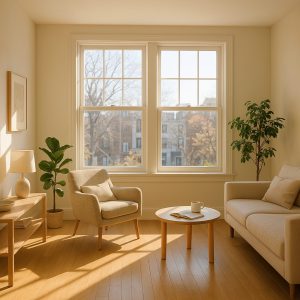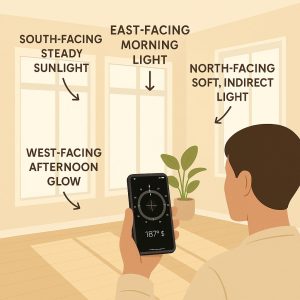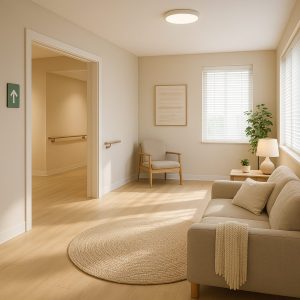When most people tour a home, they look at square footage, finishes, and layout. But one of the most important features is often overlooked. Natural light.
Natural light is not just about aesthetics. It shapes how we experience a space. It affects mood, energy, safety, and comfort. For many buyers, especially those with disabilities or sensory needs, lighting can be the difference between a house that works and one that quietly wears you down.
I learned that the hard way. Before I became a real estate agent, I lived in an apartment that felt dim at all hours. It was always gray. Always heavy. It took a toll on my mental health and made me feel disconnected from my space. When I started looking to buy a home, natural light became non negotiable.
The home I ended up buying faced south, providing steady sunlight throughout the day. In one of the bedrooms, two windows—one facing south and the other east—captured light from morning to afternoon. As a result, the room stayed bright and warm without ever feeling harsh. It instantly felt open, safe, and calm. It reminded me that lighting is not just a preference. It is a need.
As a DeafBlind real estate agent in Columbus, Ohio, I carry that awareness into every client interaction. I help people notice what most listings ignore. Because when the lighting is right, everything else starts to feel right too.

Why Natural Light Matters for Accessibility, Wellness, and Home Value
Natural light supports more than just design. It actively improves how people live in their homes. And it adds measurable value.
According to Realtor.com, homes with strong natural light can sell for up to 7% more than similar homes with poor lighting. Buyers are willing to pay more for homes that feel open, bright, and breathable. Natural light also makes rooms appear larger, supports mental health, and helps reduce energy costs.
Here is why natural light should be part of your checklist from the start.
- Low vision and visibility
For buyers with low vision, natural light improves contrast and clarity. It reduces the need for bright artificial lighting and helps people move through a space with more independence. Poor lighting can cause eye strain, disorientation, or increase fall risk. - Anxiety and mood regulation
Consistent natural light helps regulate circadian rhythm and support mental health. Bright, balanced spaces can ease symptoms of anxiety or seasonal depression. It helps a home feel more stable, especially for people sensitive to their environment. - Sensory sensitivity and neurodivergence
People with sensory processing needs often struggle with flickering bulbs or intense artificial lighting. Natural light offers a softer and more reliable alternative. It creates calmer environments that feel easier to exist in. - Aging in place
Older adults benefit from natural light for both safety and health. It improves depth perception, supports vitamin D, and makes daily tasks like cooking or reading more manageable. - Work from home productivity
Natural light improves focus and reduces eye strain. It helps people feel more energized and connected to their space during long hours at home. A sunlit desk can be a game changer.
 How to Spot Good Lighting When Touring a Home
How to Spot Good Lighting When Touring a Home
Use your phone’s compass
South-facing homes receive steady sunlight throughout the day. East-facing windows bring morning light. West-facing gives you afternoon glow. North-facing offers soft, indirect light. Each one serves a different purpose depending on how you live.
Check the window placement
Are the spaces you spend the most time in getting the best light? A bright kitchen in the morning or a glowing office in the afternoon makes a real difference.
Revisit at different times
A home that feels bright during a showing might feel dim by evening. If you can, visit again at another time of day to see how the light shifts.
Think beyond brightness
Natural light makes rooms feel bigger and more breathable. It helps you feel more connected to the space and brings out the best in every corner of the home.
 How I Bring This to Real Estate
How I Bring This to Real Estate
Most agents will mention windows. I think about what those windows actually do for your life.
I pay attention to the things that impact how a home actually functions. Light. Layout. Flow. The parts that shape your everyday experience but rarely make it into a listing description.
If you have access needs, sensory considerations, or simply want a home that feels better, I can help you find that. No explaining necessary.
This is what I mean when I say I take a holistic approach to real estate. People do not just buy houses. They buy how it feels to live in them. How the space supports their needs. How it fits the rhythm of their life.
Where your goals lead I open doors.
Whether you are ready to buy or just starting to explore your options, let’s plan it together. My job is to guide you with clarity and keep you informed so you can make the best decision for your life, not just your mortgage.
You do not have to do this alone. I am here as your trusted advisor.


 Facebook
Facebook
 X
X
 Pinterest
Pinterest
 Copy Link
Copy Link
 How to Spot Good Lighting When Touring a Home
How to Spot Good Lighting When Touring a Home How I Bring This to Real Estate
How I Bring This to Real Estate